Posted in category "Dissent"
Late last year the Italian bishops’ television channel, TV2000, broadcasted a series of conversations between the pope and a Catholic prison chaplain looking at the Lord’s Prayer line by line. The episode broadcast on December 6, 2017 focused on the line, “Lead us not into temptation.”
Pope Francis suggested the Church should amend the translation of the “Our Father” to clear up the confusion around the phrase, “Lead us not into temptation.” “That is not a good translation,” the pope said in the December 6th interview with Italian television. 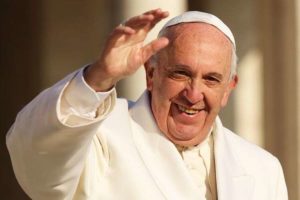
“I’m the one who falls,” Pope Francis explained. “But it’s not God who pushes me into temptation to see how I fall. No, a father does not do this. A father helps us up immediately.” “The one who leads us into temptation is Satan,” the pope said. “That’s Satan’s job.”‘
A possible alternative to “Lead us not into temptation” is “Do not let us fall into temptation.” In his interview, Pope Francis suggested that the phrase be adopted more widely. I was surprised to learn Catholics in several countries have used a new translation for some time. “Do not let us fall into temptation” is currently used by the Church in France, Spain, Belgium and Benin. In Italy, “Do not abandon us in temptation” has been used since 2008.
There are no Bible stories or saints’ tales I can recall where God leads a person towards temptation. The one prominent story of Jesus being tempted in the desert was through his encounter with Satan. God didn’t lead Eve to eat and offer the forbidden fruit. There are hundreds of anecdotes of tempted saints, but they feature demons, devils or sexy women.
The National Catholic Register, a conservative bi-weekly, devoted major space in its December 24, 2017 edition to the Our Father line translation, with a front-page story and editorial rebutting the pope’s suggested change. The reasoning to oppose a change was either theological, political or emotional. 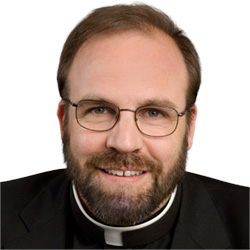
The author of the article was Msgr. Charles Pope, pastor of Holy Comforter-St. Cyprian parish in Washington, DC. He is a contributor to Community in Mission, a blog of the the Archdiocese of Washington, DC. In his article, Msgr. Pope elaborated on three key points:
- “While the intention may be to assist the reader to understand that God does not tempt us or directly cause us to fall, the effect is to imply that the inspired Greek text is inadequate.”
- “Second, in the English-speaking world, the Lord’s Prayer is one of the few prayers we have in common with non-Catholics. Even many of the unchurched have committed it to memory.”
- “Lastly, by changing the line we will miss a “teachable moment” in which an important truth about God can be explained.”
“Surely God does not tempt us in any direct sense,” Msgr Pope reasoned. “He does not will to entrap us or to confound us so as to make us fall. However, because he is the first cause of all existing things, he is also the first cause of things that tempt us. So, in asking God to “lead us not into temptation,” we ask him, who, providentially holds us and all things in existence, to lead us forward with the graces we need to resist it. This will allow us to enjoy the good things he gives without giving way to the temptations of inordinate desires.”
Msgr. Pope’s analysis is good, and it is worth pondering as a spiritual reflection. But his explanation on the meaning of one line involves a long and very intellectual argument–counter intuitive to a simple petition. Msgr. Pope concludes that we should “remain rooted in the translation of the Lord’s Prayer that has sustained and united the English-speaking world for hundreds upon hundreds of years.”
This statement by Msgr. Pope is not entirely accurate. Since the Reformation, Christians have disagreed on the wording and translation of another line in the Lord’s Prayer: “Forgive us our trespasses, as we forgive those who trespass against us.” Catholics, Orthodox, Lutherans, Methodists and most Anglican/Episcopalians use this version. Presbyterians and other Christians use, “Forgive us our debts, as we forgive debtors.” Some Christians replaced “trespasses” and “debts” with “sins.” The different words have different meanings in the ‘English language. “Trespasses” means having crossed a line that may or may not have been clearly marked. “Debtors” implies someone owes you and hasn’t settled the debt. What we hear from the prayer depends on the words we use.
I have started to say: “Do not let us fall into temptation” when I say the Our Father in prayer or at Mass. I was glad to let go of “Lead us not into temptation,” which I have always felt was antithetical to trusting God. 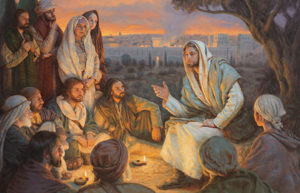

Wednesday morning I was having my morning coffee and thumbing through the New York Post when I spotted this item on the bottom right of page 12: “Paris suicide vs. gay rights.” I took a bite of my English muffin and read on.
The blurb stated that Dominique Venner, 78, placed a pistol in his mouth and committed suicide beside the altar in Notre Dame cathedral in protest of the legalization of gay marriage in France. 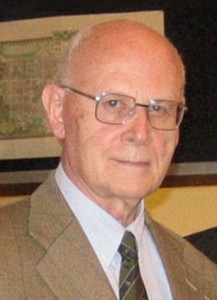
Mr. Venner, a presenter on a Catholic-traditionalist radio station and controversial historian, posted an essay on his website earlier in the day calling for “new, spectacular and symbolic actions to shake us out of our sleep, to jolt anaesthetized minds and to reawaken memory of our origins.”
The cathedral, which is celebrating its 850th anniversary this year, was evacuated and immediately closed to the public for several hours. A cathedral security guard tried to revive Mr. Venner as he lay beside the altar.
“We did not know him, he was not a regular at the cathedral,” said the rector, Monsigneur Patrick Jacquin. He added that as far as he knew, this was the first suicide within the cathedral since it was founded. “We will pray for this man as we pray for so many others who are at their wits’ end,” he said.
The next day, a topless activist of the FEMEN movement was arrested inside Notre Dame for staging a fake suicide. 
The bare-chested woman was photographed in front of the altar, pointing a fake gun in her mouth. The slogan “May Fascists rot in Hell” was written across her torso.
On its Facebook page, FEMEN France called the topless activist “FEMEN’s angel of Death.” The group called upon “all European Nazism, in the face of all their underhitlers and halfmussolini, to follow the example of the ultra-right man Dominique Venner and immediately commit a suicide of their believes excluding themselves from the political area in Europe.” The statement added, “Hurry up, there is not so much place left on the sacrificial altar of Notre-Dame de Paris.”
In case you are wondering, the Censor Librorum finds both of these events cringe-worthy.
Venner’s use of sacred space as a stage for suicide is the most spectacular form of selfishness I have ever seen. The follow up performance by an exhibitionist mocking his suicide was almost as bad.
And I thought we had nuts in New York!
I stumbled on the name of Tanchelm thumbing through my copy of Magnificat. He was featured prominently in a story about St. Evermod, a bishop who died in 1178. Evermod was inspired to devote his life to God after hearing a sermon given by Saint Norbert, the founder of the Premonstratensian order. Evermod became a priest of Norbert’s order and was chosen to accompany him on a jorney to Antwerp to counter the followers of Tanchelm, an itinerant preacher who had been murdered a decade before by a priest.
“The city was at the time in a state of ferment due to the heretical preaching of Tanchelm,” the Magnificat huffed, “a man of depraved morals who attacked the hierarchy and the church’s teaching on the sacraments, particularly the Holy Eucharist.”
Evermod remained in Antwerp to combat Tanchelm’s “propaganda.” His apostolic zeal earned him an eventual sainthood, as it did St. Norbert, who is often pictured with a foot on Tanchelm holding a monstrance. Tanchelm’s heresy were his attacks on the doctrine of the Real Presence of Christ in the Eucharist. 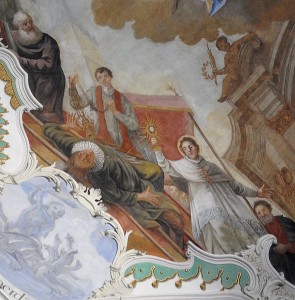
Who was Tanchelm that he made two bishops saints in their attempts to overcome his preaching?
Tanchelm was born around 1070. He might have been Flemish, but was probably a native of the Netherlands. He traveled to France, Germany and Rome. Most of what we know about him came from those opposed to him, for Tanchelm did not leave behind any writing that has survived. Tanchelm began preaching during a time of agitation and pontifical reform, with furious arguments and political maneuvering over clerical marriages and sexual liaisons, simony, and canonical investiture by feudal authorities. He was active in a wave of church reform that started in the High Middle Ages and culminated in the Reformation 400 years later.
Tanchelm was supposed to have been a monk, perhaps a notary or officer from the circle of Count Robert II of Flanders (1092-1111), famous from his crusading days as “Robert of Jerusalem.” The exact relationship between the count and Tanchelm is not clear. Both Count Robert II and his overlord, Louis VI of France. were interested in weakening the ecclesiastical power of the Holy Roman Emperor in the low countries. The power of the emperor rested to a large extent on the support of the bishops, especially Cambrai, Cologne and Utrecht.
In 1111 Count Robert II dispatched Tanchelm and the priest, Everwacher, to Rome to persuade Pope Pascal II to incorporate Zeeland into a French diocese. Frederick I, archbishop of Cologne, caught wind of the plot and intervened. The pope rejected the petition, and Talchem and Everwacher returned home.
After his return from Rome Tanchelm began his ministry. There is no direct knowledge of his motivations, but some authors have speculated that while he was in Rome he absorbed the principals of the Gregorian Reforms, initiated by Pope Gregory VII, circa 1050-1080, which dealt with the moral integrity and independence of the clergy.
Gregory VII attacked the practice of simony – the purchase of church offices. This precipitated the investiture controversy; kings were selling clerical and church offices at great personal gain. In 1074 Gregory VII published an encyclical absolving the people from obedience to bishops who allowed married priests. In 1075, he enjoined them to take action against married priests, and deprived these clerics of their revenues.
Dressed in his monk’s habit, Tanchelm began to preach. Many people came to hear him, and his following grew. People were drawn to him by his compelling personality and oratory. He began preaching in 1112 in the Low Countries (Belgium, the Netherlands, parts of northern France and western Germany).
It was in Antwerp that he made his deepest mark. The spark that set him off was the “concubinage” of a priest named Hilduin with his niece. He stepped into a vacuum of spiritual leadership: people were disgusted with with the morals of their spiritual guides and were drawn to Tanchelm’s criticism of the established church. It was also a time of the first stirrings of social discontent against the feudal privileges of nobles and clergy.
Tanchlem rejected obedience to bishops and priests. He preached against the payment of tithes. Some sources say Tanchelm told people to reject the sacraments, saying they were better named pollutions than sacraments. In another version, he said the virtue of the sacraments depended on the virtue of the minister, and that polluted priests could only administer polluted sacraments. The chapter of Utrecht also reported with horror that Tanchelm had said that “the churches of God are to be considered whorehouses.” It is more likely what Tanchelm really said is that the priests were so impure they turned churches into brothels.
The prime source of information on Tanchelm is a May 16, 1112 letter from the clergy of Utrecht to Archbishop Frederick of Cologne telling him to take Tanchelm into custody and not release him for any reason. He was briefly put under arrest in Cologne in 1113/1114, but released in spite of protests by the cathedral clergy of Utrecht.
The hierarchy of Utrecht circulated many tales about Tanchlem to support their denouncements:
-He dressed in golden clothes, with strands of gold curled in his hair
-Claimed to be guided by the Holy Spirit, and conducted a ceremony in which he “married” the Virgin Mary
-His followers venerated him, and drank his bath water as a blessing or sacrament
-His inner group was a guild of 12 men lead by his blacksmith friend, Manasses. Probably chosen as a bodyguard, they were known as “the Apostles.” Added to this number was a woman named “Blessed Virgin” with whom the Apostles had intercourse as kind of a confirmation ceremony. The Apostles carried his regalia and sword in procession.
-Tanchelm deflowered young girls in the presence of their mothers
-Men offered up their wives and children to Tanchelm’s lust.
To what degree the above accusations have some basis in truth-or are total fabrications–is unknown. It seems clear that Tanchelm was a very charismatic man, and encouraged his personality cult.
In 1115 he was bludgeoned or stabbed to death by a priest during a river trip. One scholar has implicated the Archbishop of Utrecht in his murder.
Tanchelm doesn’t have an exact contemporary in our age, even if the societal unrest, currents of church reform, the involvement of church hierarchy in politics, the attempts by secular rulers to use bishops in their schemes, all have an echo in our era.
St Norbert arrived at Antwerp eight years after Tanchelm’s death to evangelize the city away from his followers. Apparently, he did not censure, judge or condemn when he addressed people, which probably contributed to the success of his mission. “Brothers, do not be surprised and so not be afraid,” he preached. “Unwittingly, you have pursued falsehood thinking it to be the truth. If you had been taught the truth first you would have been found effortlessly tending toward salvation, just as you now effortless lean toward perdition.”
Norbert of Xanten is portrayed as a reformer of the clergy and siding with reformist popes over lay investiture. But his ministry started on a political track opposite Tanchelm’s.
His father, Heribert, Count of Gennep, was related to the imperial house of Germany. Norbert was a secular canon at St. Victor’s Collegiate Church in Xanten and was ordained subdeacon without making an effort to live the clerical life. Somewhere between 1108 and 1109 he became chaplain at the court of Archbishop Frederick of Cologne and already in 1110 he was a chaplain at the court of Emperor Henry V. He accompanied the emperor to Rome in 1111.
In the spring of 1115, while riding to the village of Freden, he was thrown from his horse during a sudden thunderstorm. This event gave Norbert the impetus to change his way of life. He gave up his chaplaincy at the court and dedicated himself to meditation and living a life of poverty. Feeling he was called to priesthood, he presented himself to the Bishop of Cologne, from whom he received Holy Orders.
Norbert would have to have heard 0f, and perhaps even met, Tanchelm in Rome or while he was being held in custody by his patron, Federick, Archbishop of Cologne.
It is interesting to speculate what the men might have said to each other.
Jesuit priest Bob Carter’s obituary appeared in the New York Times on March 15, 2010. He was 82 when he died. I hadn’t heard about him in years, even through grapevine gossip from old Dignity friends.
Probably the last time I saw him was in the early ’90s at a Dignity event. I was part of a panel for Dignity New York’s 20th or 25th anniversary. They invited all the “outlaws” and other colorful characters from the past to bring their remembrances. Andy Humm was there and a member of the panel with me. I remember I sat next to John McNeill. I dressed up. It was probably the first and only time I was in a skirt at Dignity.
Bob Carter must have been on the panel, too. He was very much in the same mold as McNeill. He was a strong voice for gays in the Church, but “gay” meant “gay men.” McNeill didn’t have much use for women, and neither did Bob Carter.
McNeill had, as I recall, had one tiny section dedicated to the issues facing lesbians in the Catholic church in his famous and seminal book, The Church and the Homosexual. McNeill said, “I don’t know very much about lesbians, so I can’t write about them.” Unfortunately, he didn’t try to learn either. Mainly, I think, because women weren’t part of his life and he wasn’t particularly interested in them or struggles relevant to them, namely inclusive language and priesthood.
A lot had changed since those heady and turbulent days of the ’80s. Many Dignity members from that time had died from AIDS. Dignity had changed a lot of its language and attitudes to be more inclusive and welcoming of lesbian Catholics. Being thrown out of St. Francis Xavier Church had an impact. Not being able to congregate in a Catholic church with other priests, ex-seminarians and gay Catholic men helped to torpedo the homophile aspect of Dignity and bring them out into the wider world of outsiders. Once that happened it became a friendlier place to women, although it’s still mostly men. However, that’s not Dignity’s fault. By the late ’80s and 1990s most Catholic lesbians had given up on organized religion as too sexist and homophobic.
The Times obituary was a very good article on Carter and there is little I can add to it. You can read it here.
A picture of him marching in a gay pride day parade in full Roman collar with three other priests was used in the obituary. I would guess that photo was taken in 1981 or 1982. I remember it well — I was marching with them as part of Dignity New York. Besides Bob Carter and Fr. McNeill, Fr. Bernie Lynch marched in his collar, and another priest from Dignity who I recognize, but can’t member his name. I recall that he was a nice guy. 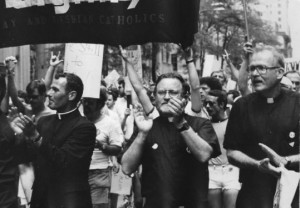
I can’t emphasize enough how incredibly brave it was for those four men to march at the head of the Dignity chapter in full Roman collars. It was a deliberate statement: we are Catholic priests. We are ministering to and members of an organization dedicated to full inclusion of gays in the Church. That active clergy expressed solidarity with gay and lesbian Catholics (just as Sr. Jeannine Gramick and Fr. Bob Nugent did with New Ways Ministry), gave heart to a generation of gay Catholic activists, their families and friends, and lent a certain credibility and sanction to efforts to change the church.
I will always remember that march, and the applause and roars of approval as the Dignity banner was proudly carried down Fifth Avenue to the Village. The four priests and Dignity group were applauded the entire line of the march. We applauded back at demonstrations of support.
Bob, (it was never Father Bob) saw no contradiction in being Christian and homosexual: “Since Jesus had table fellowship with social outcasts and sinners, those rejected by the religious establishment of his time, I consider myself to have been most fully a Jesuit, a ‘companion of Jesus,’ when I came out publicly as a gay man, one of the social rejects of my time. It was only by our coming out that society’s negative stereotypes would be overcome and we would gain social acceptance.”
That statement was vintage Bob Carter: the bravery and the homophile self-centeredness. That is what the men Bob Carter ministered to in the ’70s and ’80 wanted more than anything–a church that would accept them totally for who they were. For the most part, they were faithful, devout, traditionalist Catholics in every way – except for the fact that they were gay.
So I applaud Bob Carter for the work he did. I just wish he would have taken his gay activism up a notch to address the injustices lesbian Catholics had to face – the lack of access to power, and the lack of visibility in liturgical language.
As a Dignity New York board member, Bob Carter approved women speaking from the pulpit, so long as their sermons were called “non-homilies.” The homily was only reserved for priests. Gay or not.
On February 5, 2010 USCCB president Francis Cardinal George issued a statement publicly disparaging New Ways Ministry. Upon reading it, my first thought was: what little we have is even too much.
Sr. Jeannine Gramick and Fr. Bob Nugent, co-founders of New Ways, were like a lighted, open doorway in a dark alley. Many gay and lesbian people, myself among them, came home through them and their ministry. God knows what would have become of us without them. They were a beacon of welcome, friendship and compassion in a very hostile world. 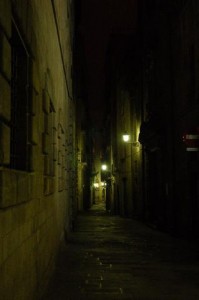
For 33 years New Ways Ministry has been a source of comfort, support, affirmation and encouragement for lesbian and gay Catholics to come back and remain within the institutional church. It is the one place where we can be affirmed in who we are without any sense of shame, regret or self-loathing.
“Anyone who has taken the time to listen to the stories about the lives of lesbian/gay people will come to realize that guidance about sexual activity is not where they need help most,” said Frances DeBernardo, Executive Director. “It is in the areas of living truthfully, openly, honestly, and courageously–the areas that consume most of their time and energy–where they seek the support of the church.”
These are areas where the Church offers no support.
The starting point for New Ways Ministry has always been less of the teaching of the Magisterium and more towards the Beatitudes – the values expressed by Jesus. True, the organization has not admonished gay Catholics they must live chastely or to “strive” to live chastely, the way the officially-sanctioned Courage Apostolate does.
Cardinal George stated that since the founding of New Ways Ministry in 1977, “serious questions have been raised about the group’s adherence to church teaching on homosexuality.” “No one should be mislead by the claim that New Ways Ministry provides an authentic interpretation of Catholic teaching and an authentic Catholic pastoral practice,” George said. “Genuine pastoral concern is based on respect for every person, no matter their sexual orientation, and acceptance of the truths of the Catholic faith,” he added. “These are the terms in which the church welcomes everybody and offers them a true home in Christ’s love and mercy.” 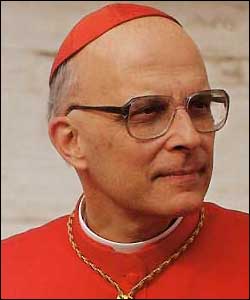
Why did Cardinal George pick this time to start a kerfuffle with New Ways: Could it have anything to do with the fact the Courage is having their 2010 annual conference this July at the University of St. Mary of the Lake Seminary in Mundelein, Illinois? Or, that New Ways Ministry is planning a workshop in March 2010 in the Chicago area?
This program – “Next Steps – Developing Catholic Lesbian/Gay Ministry,” is billed as a “weekend of prayer, presentations, dialogue, and planning designed to assist those seeking ways to include lesbian/gay people and issues in their home parishes, schools, or other ministerial settings.”
Is the notion of openly gay Catholics (chaste and not) in Catholic settings threatening? The possibility that people in the pews might experience doubt about the “intrinsic evil” of lesbian and gay relationships once they know us–their fellow parishioners–as caring people, as loving parents, as devoted and committed couples?
The condemnation of New Ways Ministry by Cardinal George has sparked a healthy debate among faithful Catholics online. I found the following exchange over at America magazine’ s website informative and heartening.
One writer, Jeffrey L. Miller posits: “They (New Ways Ministry) are a openly dissident group that has never believed what the Church believes on same-sex attraction and have damaged countless individuals by encouraging a disorder instead of helping them to live what the Church believes and to live a chaste life. Organizations like New Ways Ministry cooperate with evil by not teaching that homosexual acts are intrinsically disordered and thus encourage sin. It is a spiritual work of mercy to help your brother repent, it is an evil act to tell them they don’t need to repent.”
“Jeffrey: I hereby encourage you to repent:” countered Jim McCrea.” ‘The Pharisees’ sin has come to be called ‘scotosis,’ a deliberate and willful darkening of the mind that results from the refusal to acknowledge God’s presence and power at work in human stories. If the neglect of Scripture is a form of sin, a blind adherence to Scripture when God is trying to show us the truth in human bodies is also a form of sin, and a far more grievous one… If it is risky to trust ourselves to the evidence of God’s work in transformed lives even it when challenges the clear statements of scripture, it is a far greater risk to allow the words of Scripture to blind us to the presence and power of the living God.’
“And it is even worse,” McCrea added, “to allow the words of a very fallible, defectible and historically indefensible human church to do the same.”
Steve Schewe drolly observed: “Mr. DeBernardo’s statement that ‘we have always been found to be firmly in line with authentic Catholic teaching’ seems disingenuous; I wish he would have acknowledged his organization’s long history of differences with the Catholic hierarchy, including the disciplining of Sr. Gramick and Fr. Nugent. This is all old news.” 
“So why did Cardinal George let loose with his condemnation this week? Could it have anything to do with the testimony by U.S. military leaders in the Senate advocating a process to end DADT, and the relatively calm response to their testimony? A rising tide of tolerance towards gays and lesbians continues; it will be interesting to see how the attempt to overturn Proposition 8 in California turns out, particularly since one of the lead attorneys for the plaintiff, Ted Olson, is a leading conservative with impeccable credentials.”
“Given the growing national acceptance of gays and lesbians in secular society and among people of faith, Cardinal George’s attack brings to mind the late Jaroslav Pelikan’s quip that “heresy may be the result of poor timing.”
“Heresy may be the result of poor timing”–I’ll be sure to share that one with Sr. Jeannine Gramick the next time I see her. She’ll appreciate it.
Mary Daly, 81, died two weeks ago, mostly forgotten, certainly unshriven. Carolyn Moynihan, deputy editor of MercatorNet, noted that Daly “seems to have departed this life as a kind of orphan herself. The New York Times obituary notes that she ‘leaves no immediate survivors’. No family on earth? No father in heaven? I hope it really was not like that for Mary Daly at the end.” 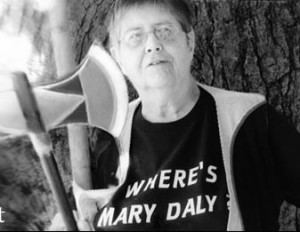
After her two first two books, which stood the Catholic world on its head, Mary Daly spun off into the ether, writing books with titles like: Outercourse: The Be-Dazzling Voyage; and Quintessence..Realizing the Archaic Future. Daly created her own language, but most people weren’t interested in learning it. She lost her hold on the larger Catholic imagination.
In the 80s the lesbian herd moved past her, too, migrating on towards the mainstream–“Ellen,” “The L Word,” “Rachael Maddow,” “Suze Orman,” human rights, marriage rights and child rearing. The labrys pendant was lost or forgotten. Daly was, too.
Mary Daly was the quintessential Irish Catholic girl. Born October 16, 1928, in Schenectady, NY, she went all through Catholic schools, and received a BA from the College of St. Rose in Albany, NY and a MA from Catholic University in Washington, DC. After earning her doctorate in religion from St. Mary’s College in Notre Dame, Indiana, in 1953, she went on to obtain two degrees from the University of Freiburg in Switzerland, since no U.S. institutions at the time offered theology doctorates to women.
Dr. Daly was hired as an assistant professor at Jesuit-run Boston College in 1967, when the school only enrolled men. She started as a reformist, and her first book, The Church and the Second Sex, (1968) she argued that the Catholic Church was patriarchal in nature and had systematically opposed women for centuries. In response, the college attempted to dismiss her, but the support she received from students and the public kept her in the classroom.
As a student in the early ’70s at Trinity, an all-women’s college in Washington, DC, I was thrilled about Mary Daly and her books. “Someone speaking for us,” I thought as I picked one up, “someone speaking the truth about what it’s like to be a woman in the Catholic Church.”
Sr. Joan Chittister reflected on Daly’s impact on history: “I learned how to look newly at things I’d looked at for so long that I was no longer really seeing any of them. Women need to thank Daly for raising two of the most important theological questions of our time: one, whether the question of a male God was consistent with the teaching that God was pure spirit, and two, whether a church that is more patriarchal system than authentic church could possibly survive in its present form. These two questions have yet to be resolved and are yet rankling both thinkers and institutions.”
Daly came out as a lesbian in the early 70s–when she was in her 40s. She began to study ancient cultures, and came to regard all major modern religions as oppressive to women, a view expressed in her second book, Beyond God the Father (1973). Her original critique of the Roman Catholic Church as a bastion of patriarchy was extended to the entire Christian tradition. She rejected Christianity’s focus on a monotheistic deity and what she attacked as its intrinsic patriarchy. She asserted that Christianity’s focus on Jesus Christ was just another dimension of its patriarchy–a Savior in a male body.
As Margaret Elizabeth Kostenberger explains, Daly’s “compete rejection of Scripture” on the basis of its “irremediable patriarchal bias” took her far outside the Christian faith. While other feminists called for the adoption of female or gender-neutral language for God, Daly attacked those efforts as half-measures that fail to take the “phallocentricity” of theism seriously.
Her famous dictum, “If God is male, then the male is God,” stood at the heart of her argument against religion. She accused Christianity of “gynocide” against women and suggested that all monotheistic religion–and Christianity in particular–is “phallocentric.”
“I urge you to sin,” she wrote to women readers. “But not against these itty-bitty religions, Christianity, Judaism, Islam, Hinduism, Buddhism–or their secular derivatives, Marxism, Maoism, Freudianism and Jungianism–which are all derivatives of the big religion of patriarchy. Sin against the infrastructure itself!”
In 1999 Professor Daly left Boston College after a male student threatened a lawsuit when he was denied a place in her class on feminist ethics. She had long limited enrollment in some advanced women’s studies classes to women only, maintaining that the presence of men there would inhibit frank discussion.
What happened to Mary Daly, that she imposed the same gender barriers in her classrooms as she experienced? Daly went to Europe for advanced degrees because no U.S. Catholic university would accept a woman in a theology program. Years later, Daly bared men from her advanced courses in women’s studies because she felt their presence would have a negative impact on the other students. Men, she said, “have nothing to offer but doodoo.”
It may be retribution, but it doesn’t seem right. How do you rail against a system of discrimination, and then implement it with glee yourself?
So I am left with a mystery to solve: why did Mary Daly, a “post-Christian,” continue to affiliate with Boston College, an unabashedly Catholic institution? Love and hate are bound very closely. Daly was never indifferent.
Perhaps it began with a girlhood hurt. Daly wrote about her intellectual formation in a 1996 article in the New Yorker “Sin Big,” in which she recalled being mocked by a male classmate, and altar boy, at her parochial school because she could never “serve Mass” because she was a girl.
“(T)his repulsive revelation of the sexual caste system that I would later learn to call ‘patriarchy’ burned its way into my brain and kindled an unquenchable Rage,” she wrote.
Daly described herself as a pagan, an eco-feminist and a radical feminist in a 1999 interview with The Guardian newspaper of London. “I hate the Bible,” she told the paper. “I always did. I didn’t study theology out of piety. I studied it because I wanted to know.”
So with all that, how could she in good conscience continue to teach at a Catholic university?
Here’s what I think: at BC, Daly could be an outlaw, get a paycheck, credibility for book deals, and still have the protective mantle of identity that gave her cachet: a professor at a highly regarded Catholic university.
She lived on the piercing insights she fearlessly raised 40 years ago. But Daly had ceased to be a theologian, and even her philosophical writing declined into self-important gibberish. She should have taken her own advice–a person becomes stagnant if they don’t move on. 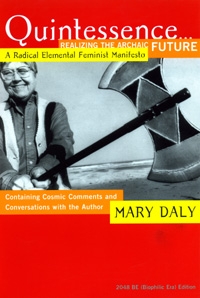
If you’re going to call yourself a Post-Christian, then be Post-Christian. If you have moved on… move on, and stop clinging to institutions that you say you no longer believe in.
A man wrote the best epitaph for Daly that I have read: “When I was in the seminary, attending class at B.C. during the eighties, Mary Daly was a joke. Imagine my surprise when, years later, as a purely cynical move to impress a feminist scholar, I cited Mary Daly in a paper, but was not able to put her work down. Although her work never persuaded me to abandon my beliefs, or my own thinking, Mary did push me to consider a whole world of concern that years earlier I would have dismissed as nonsense. Now, when I think of her, I do not think of a nut, or a totally whacked out feminist. I think of a pioneer, who, although not worthy of discipleship, is certainly worthy of being taken seriously as a thinker and a human being. I wish I had met her, although I’m not sure of how it would have turned out.”
Everything That Rises Must Converge is a story in Flannery O’Connor’s book of the same name. It is a tale of nostalgia, prejudice, relationships, superiority, resentment, and ultimately, the space between people who perceive the same thing differently. 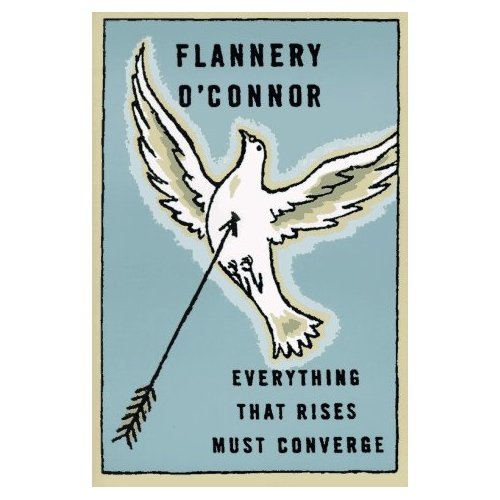
The title is a quotation from Catholic theologian Pierre Teilhard de Chardin, who imagined an “omega point†at which the “rising†or evolving human being would meet God.
I see the rising as a metaphor describing the struggle, debate and entanglement of the many different strands and tendrils of thought, belief, and action over what it means to be Catholic. And, at the end, where the distances close as we all meet in God.
The debate over Catholic identity has exposed two extremes in Catholicism: what author and scholar George Weigel calls “Catholic lite,” meaning a form of faith sold out to seclarism; and what analyst and correspondent John L. Allen, Jr. terms “Taliban Catholicism,” meaning an angry expression of Catholicism that knows only how to excoriate and condemn.
In recent days there has been a very public exchange between Thomas J. Tobin, Bishop of Providence, Rhode Island, and Sen. Patrick Kennedy, D-Rhode Island, over the senator’s support of an amendment to the health care bill before Congress. The amendment addresses public financing of abortions.
In a letter published in the diocesan paper and on their website, Bishop Tobin wrote to Senator Kennedy saying, “For the moment I’d like to set aside the discussion of health care reform, as important and relevant as it is, and focus on one statement contained in your letter of October 29, 2009, in which you write, “The fact that I disagree with the hierarchy on some issues does not make me any less of a Catholic.†That sentence certainly caught my attention and deserves a public response, lest it go unchallenged and lead others to believe it’s true. And it raises an important question: What does it mean to be a Catholic?” 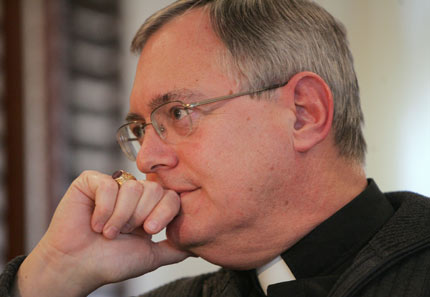
“Although I wouldn’t choose those particular words, when someone rejects the teachings of the Church, especially on a grave matter, a life-and-death issue like abortion, it certainly does diminish their ecclesial communion, their unity with the Church. This principle is based on the Sacred Scripture and Tradition of the Church and is made more explicit in recent documents.”
“But let’s get down to a more practical question; let’s approach it this way: What does it mean, really, to be a Catholic? After all, being a Catholic has to mean something, right?”
“Well, in simple terms – and here I refer only to those more visible, structural elements of Church membership – being a Catholic means that you’re part of a faith community that possesses a clearly defined authority and doctrine, obligations and expectations. It means that you believe and accept the teachings of the Church, especially on essential matters of faith and morals; that you belong to a local Catholic community, a parish; that you attend Mass on Sundays and receive the sacraments regularly; that you support the Church, personally, publicly, spiritually and financially.”
“In your letter you say that you “embrace your faith.†Terrific. But if you don’t fulfill the basic requirements of membership, what is it exactly that makes you a Catholic? Your baptism as an infant? Your family ties? Your cultural heritage?”
I cannot fault the bishop in the points he raises about being a Catholic and the questions he poses to Senator Kennedy publicly. In his role as teacher and pastor he should do so.
However, what I am uncomfortable is the reduction of anyone’s Catholic identity to one issue – abortion. It seems to me that “pro-life” Catholics –bishops included–need to have the same unwavering commitment to feeding, clothing, housing and educating children and young adults; and keeping them out of wars and death row prison sentences.
In a 2006 study by Elizabeth Oldmixon and William Hudson – When Church Teachings and Republican Ideology Collide: The Perspectives of Catholic Republicans in the House of Representatives, a sampling of Catholic Republicans justified not supporting Catholic Social Teaching by seeing its application to most domestic social issues as less authoritative than Church moral teachings on issues like abortion.
On March 10, 2006, the U.S. Conference of Catholic Bishops issued a “Statement on Responsibilities of Catholics in Public Life.” The bishops were very firm and unqualified in their oppositionto abortion, but their remarks were not limited to this one issue.
“Our faith has an integral unity,” they said, “that calls Catholics to defend human life and human dignity whenever they are threatened. A priority for the poor, the protection of family life, the pursuit of justice and the promotion of peace are fundamental priorities of the Catholic moral tradition which cannot be ignored or neglected. We encourage and will continue to work with those in both parties who seek to act on these essential principles in defense of the poor and vulnerable.”
I really liked what Kevin J. Farrell, Bishop of Dallas said in his May 17, 2009 commencement address at the University of Dallas, an independent Catholic University in Irving, Texas. “If and when others may disagree or have a different approach or have a different slant on Catholic teaching or belief, honest debate, not confrontation, true dialogue, where we seek to understand the other, not facile condemnation, should be the overreaching way we move forward together,” he said in his address. 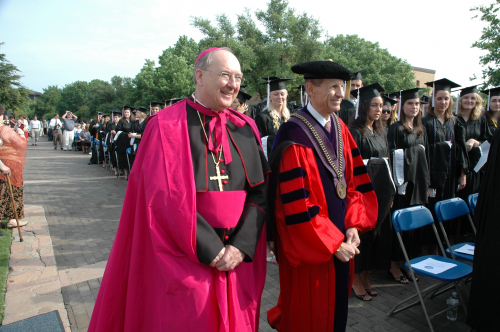
Bishop Farrell posed the question, “What does it mean to be Catholic enough?” and offered several possible answers: “It means adhering to the magisterium of the church and taking very seriously the length, breadth and depth of Catholic tradition…It means taking very seriously the challenge which theologians in the church have always taken up – to face into and revere the contemporary culture and to relate revelation and our Catholic faith to that culture…It does not mean parroting words and phrases from one or another time and place in the church’s history as though that were the only way to speak of things divine and of things Catholic…It means being a leaven in a society that seeks insight, example and inspiration even as it claims to be postreligion, postchurch and post-Christianity.”
“It means being humble before God and each other, acknowledging that no one of us has all the answers to the question, What does it mean to be Catholic enough? We know well that no one of us can ever have all the answers. No theologian or professor or pope has ever had or ever will have all the answers to what it means to be authentically and fully Catholic.”
The megalomanic bishop of Scranton, Pennsylvania, stepped down on August 31, 2009. Even the Pope had enough. 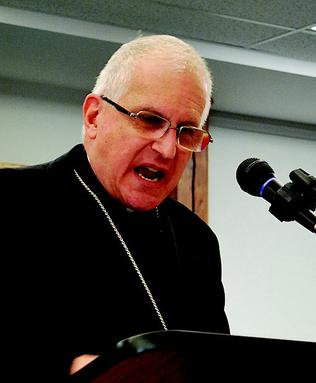
Ordinary Catholics had expressed their opinion on his leadership: the Diocese of Scranton’s annual fundraiser fell $274,000 short of its $5.3 million goal–the first time in the two decades since the establishment of the annual drive the diocese did not reach its goal.
Critics of the bishop’s management of the diocese – including his ongoing efforts to consolidate schools and churches – say at least part of the fundraiser’s shortfall was caused by parishioners who withheld donations out of protest.
Pope Benedict XVI accepted the resignation of Bishop Joseph F. Martino, 63, from the pastoral governance of the Diocese of Scranton for “health reasons.”
Watch a video of the press conference here.
At the press conference, Martino himself alluded to the divisions his style had brought to the diocese, and the toll it had taken on him mentally and physically: “For some time now there has not been a clear consensus among the clergy and people of the diocese of Scranton regarding my pastoral initiatives or my way of governance. This development has caused me great sorrow, resulting in bouts of insomnia and, at times, a crippling physical fatigue.”
“I seek forgiveness from anyone whm I may not have served adequately as bishop, due to my human limitations,” Martino said, adding later, “As the song says, you have to know when to hold them and when to fold them. And I think it’s time to move on.”
This controversial bishop, who gained national prominence for his strident pro-life advocacy and aggressive criticism of pro-choice Democratic politicians, was still more than a decade away from reaching the Church’s automatic retirement age of 75. Martino’s abrupt resignation, along with the fact he was not reassigned to another post within the Church–but ushered to a rural retreat center–has some church insiders suggesting that the highly unusual move was far from voluntary–and quite possibly the work of a Vatican that has been decidedly less openly critical of the Obama Administration. Church insiders also say Martino had worn out his welcome with his brother bishops in the U.S., as he began to totter dangerously over the line of separation of Church and State with his demagogue pronouncements on his Catholic teaching.
Martino’s departure came just weeks after the Archbishop of Santa Fe became the first Church leader to speak out publicly about the increasingly political behavior of a small minority of bishops within the conference. Archbishop Michael Sheehan told the National Catholic Reporter on August 12 that he spoke out during the bishops’ meeting in June, arguing that they risked “isolat(ing) ourselves from the rest of America by our strong views on abortion and the other things. We need to be building bridges, not burning them.”
From the start of his six-year tenure in Scranton, Martino alienated many with his abrasive style. He frequently clashed with the local Catholic universities–including the Jesuit-run University of Scranton–and was dismissive of their ruling bodies, arguing as bishop he would not heed their advice.
Martino seemed to take special pleasure in catigating institutions and individuals that he felt were failing to represent Catholic values.
Last February, Martino blasted another local college, Misericordia University, for inviting Keith Boykin, an openly-gay author, Clinton administration staffer and Harvard Law classmate of President Obama, to speak on campus. The university, run by the Sisters of Mercy, was “seriously failing in maintaining its Catholic identity,” Martino charged. He also sought to close down the institution’s program on diversity. 
Also in February, Martino sent a letter to the leaders of three Irish-American organizations threatening to close St. Peter’s Cathedral in Scranton during St. Patrick’s Day celebrations if groups “honor pro-abortion officials” by inviting them to speak or otherwise be honored during events in which the church might be involved. Ultimately, the Mass was held, but not before he again threatened to shut the cathedral if members of the local Catholic teachers’ union were invited to march in the St. Patrick’s Day parade. Bishop Martino refused to recognize the union.
During the 2008 presidential campaign Bishop Martino focused particular attention on vice presidental nominee Joseph Biden, the Scranton’s native son and Catholic Democrat. The bishop declared that Biden would be denied Communion if he tried to receive it at any church in the diocese, which covers the northeast corner of the state. “I will be truly vigilant on this point,” said Martino. And he warned his parishioners there would be dire consequences for supporting Biden and the Democratic ticket. In October, just prior to the election, Martino directed that a letter be read at all Sunday Masses, charging that a vote for a pro-choice politician was the same as supporting “homicide.”
Bishop Martino also called on priests and Eucharistic Ministers to act on their own to deny Communion–the central element of Catholic belief and worship–to any public officials “who persist in support for abortion and other intrinsic evils.”
One of major incidents contributing to Martino’s downfall came when he showed up unannounced as a voter-education forum at a Honesdale parish. Martino took the microphone and proceeded to criticize the organizers for discussing a comprehensive election guide, “Faithful Citizenship,” endorsed by the U.S. Conference of Catholic Bishops, instead of the letter he had drafted for the diocese on abortion.
When a nun at the forum reminded Martino that Faithful Citizenship had been prepared and endorsed by the entire bishops’ conference Martino responded, “No USCCB document is relevant in this diocese. The USCCB doesn’t speak for me,” he declared. “The only relevant document…is my letter. There is one teacher in this diocese, and these points are not debatable.”
Such comments didn’t endear him to the parishioners who organized the forum, or to his immediate superior, Philadelphia Cardinal Justin Rigali. As the head of the USCCB’s Committee on Pro-Life Activities, Rigali is just as opposed to abortion as Martino. But he is a much more politic figure. 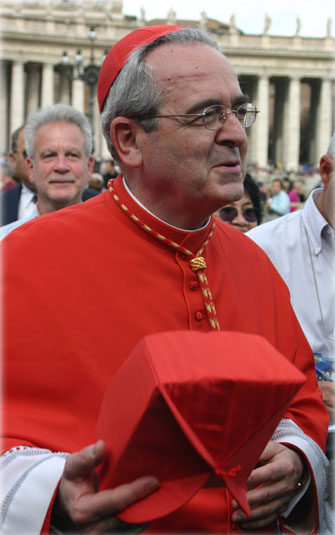
Many think Martino finally overstepped this spring when he started training his sights on Bob Casey, Jr., the Democratic senator from Pennsylvania and a staunchly pro-life Catholic. Casey’s late father, the former governor of Pennsylvania, is still revered by Catholics for speaking out against the Democratic Party’s support for abortion rights. Bu that didn’t stop Martino from sending Casey letters–also issued as press releases from the Diocesan office–warning the sentor that his oppostion to abortion was insufficient. In one such letter, Martino wrote that Casey “persist(s) formally in cooperating with the evil brought about by this hideous and unncessary (abortion) policy” and suggested that the senator could be denied Communion in the Scranton diocese.
The situation came to a head this spring, when King’s College in Wilkes-Barre, PA invited Senator Casey to speak at its commencement ceremony. Objecting to Casey’s vote to confirm former Kansas governor Kathleen Sebelius (a Catholic who supports abortion rights) as Secretary for Health and Human Services, Martino said it was “sad and disappointing” that the college chose to honor a Democrat who could not “muster the courage” to oppose “the pro-abortion agenda.”
Two days before Casey’s address at King’s College, Cardinal Rigali issued a statement “applauding” the senator for introducing legislation to promote policies that encourage women facing unplanned pregnancies to carry their babies to term. In the highly ritualized world of Church communication, the Cardinal’s announcement was akin to a public smackdown of Martino. One month later, Martino was summoned to Rome, and submitted his resignation. It was formally accepted in July, and he was out by the end of August.
During his farewell press conference, Martino was unapologetic. “I did what my mother told me to do,” Martino said. “She would also say, ‘Well, you do the right thing.’ And my conscience is clear.” He said he wasn’t trying to become a rallying point for the most vociferous foes of abortion, but he defended them saying they are often too readily dismissed by the media and even within the church because of their “passion.”
He praised vocal pro-lifers as “very dear to the Lord” because of their outspokenness, and said “bishops should encourage” them as they try to “overturn a profound cancer in our society, this sin, frankly, of murdering 50 million people (referring to the number of abortions since Roe v. Wade in 1973). I think we have become quite blase about that, and that scares me very much.”
“By the world’s standards perhaps I have not been successful here,” Martino concluded. “But I did what I thought was right.”
Clearly, not everyone agreed with that self-assessment.
The bishop’s high-profile controversy, and reports of low morale among the diocese’s parishioners and priests, did not go unnoticed around the country and in Rome, church observers say.
“It’s not the people who left the church that bothers Rome,” said Joseph K. Grieboski, a Scranton native and founder and president of the Washington, D.C.-based Institute on Religion and Public Policy. “It’s the people who stayed and are disaffected.
“People who are going to leave are going to leave no matter what, and the bishop became an excuse. It’s the people who stayed and said, ‘I stayed despite him,’ that’s what bothered Rome and that’s what bothered his fellow bishops.”
A few days ago, Pope Benedict XVI asked the Italian Bishops’ Conference for an “assessment” after the editor of its newspaper, Avvenire, was accused by another publication of homosexual behavior and harassment.
“His Holiness has asked for information and an assessment of the current situation,” said a statement posted last week on the website of the bishops’ group, which publishes the daily Avvenire.
Yesterday, Dino Boffo, director of the Italian Catholic newspaper Avvenire, resigned–ostensibly in the wake of a tumultuous feud with Italian Prime Minister Silvio Berlusconi. 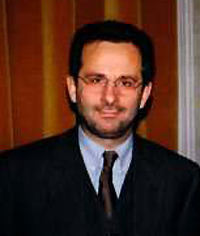
The row erupted after Boffo ran a series of stories in Avvenire that criticized the immigration policies and personal life of the prime minister.
Letters from readers complained that a Roman Catholic newspaper had a moral duty to denounce divorce, consorting with teenage girls, naked poolside parties and the prime minister being caught on tape telling a prostitute to wait for him in “Putin’s bed” while he showered.
Boffo, the editor, began to weigh in. “People have understood the unease, the mortification, the suffering this arrogant neglect of sobriety has caused the Catholic Church,” Boffo wrote last month.
Under cover of a paper owned by his brother, Paolo Berusconi, the prime minister retaliated.
Under a front page banner headline, Il Giornale, ran an article accusing Avvenire, the official newspaper of the Italian Bishops Conference, of running a “moralistic campaign” against Prime Minister Silvio Berlusconi, 72. The article went on to scrutinize Dino Boffo, 57, Avvenire‘s top editor, claiming he had a homosexual affair and had accepted a plea bargain in 2004 for harassing the wife of his lover.
The Il Giornale article openly admitted that the article was in response to Boffo’s criticisms of Berlusconi’s private life, and called Boffo a hypocrite.
In a statement, Mr. Boffo described the report as an “absurd” attempt to smear his reputation. Mr. Boffo described himself as “the first victim” in the 2001 harassment case. He didn’t elaborate on the matter.
After the story appeared, Cardinal Tarcisio Bertone, the Vatican Secretary of State and deputy to Pope Benedict XVI, telephoned Mr. Boffo to offer his “solidarity.”
He was joined by Cardinal Dionigi Tettamanzi, the Archbishop of Milan, who said he had offered Mr. Boffo his “esteem and gratitude.”
Cardinal Angelo Bagnasco, the head of the bishops conference, described the attack on Mr. Boffo as “disgusting.”
Cardinal Stanislaw Dziwisz, former secretary to the late Pope John Paul II and now Archbishop of Krakow in Poland, said it was “the first time a Catholic paper has been attacked with such violence.” He added that he was “very worried by the moral decadence into which Italy is sliding because of the behavior of certain important political leaders.”
Il Giornale ‘s attack escalated when another editorial aimed at the Catholic Church itself, mocking not just the “hypocrisy” of sexually active priests with “weak flesh,” but even the “Mitteleuropean” accent of Pope Benedict XVI, a German.
Earlier in the week Il Giornale reported how Dino Boffo had been successfully sued by a woman who claimed that he had tried to steal her husband from her in 2001. The matter, which involved a couple from Terni, near Perugia, was settled out of court in 2004 with Boffo agreeing to pay a small fine. The article claimed Boffo had been listed by police in document as a gay man “noted for this kind of activity.” (It’s not clear–harassment or chasing married men??)
The story dragged in the Italian goverment with Robert Maroni, the Interior Minister, was forced to telephone Mr. Boffo to assure him no such police document existed.
Officials said the alleged police document appeared in reality to be an “anonymous letter” sent to Italian bishops earlier this year.
Prime Minister Berlusconi and his allies had hoped to patch up his relationship with the Catholic Church after months of articles linking Berlusconi with teenage models and “spicy” parties. He denied he paid for sex after an Italian prostitute went public with claims that she slept with Mr. Berlusconi at his residence in Rome.
“Gossip isn’t enough to crucify someone,” Vittorio Feltri, the editor of Il Giornale wrote.
In April, the premier’s wife announced plans for a divorce, accusing him of “consorting with minors.”
“I’ve never had ‘relations’ with minors and have never organized ‘spicy parties,’ retorted Berlusconi. “I’ve simply taken part in engaging dinners which were absolutely in line with morality and elegance. And I’ve never knowingly invited anyone to my house who was not a serious person,” the premier told Il Giornale.
After photos of scantily clad guests and a naked man partying at his Sardinian home were published, Berlusconi then found himself embroiled in an escort scandal when Patizia D’Addario claimed she and other women were paid by Bari businessman Gianpaolo Tarantini to attend parties at the premier’s residences. 
Berlusconi admitted that he was “no saint” after the left-leaning daily La Repubblica and sister weekly Espresso posted audio takes and transcripts that it alleges are of conversations between the premier and a call girl on their websites.
Friends of the prime minister warned him he is wadding into dangerous waters with the church that could harm him politically. Many Italians care about what candidates have its normally implicit support. The church generally supports candidates on the right, like Mr. Berlusconi, making the current confrontation that much more unusual and significant.
But Berlusconi’s popularity has started to drop in the polls, and he appears deeply worried about further damage, especially from moderate Catholic voters. This week he announced he was bringing defamation lawsuits against several publications that have been critical of him, part of what his critics and allies alike worry is a dangerous trend toward treating any criticism as disloyal and possibily illegal. (Hmmmm…does this sound familiar in some Church circles??!!)
As part of an effort to mend relations with the Vatican, Mr. Berlusconi had planned to attend a high profile religious service and dine with the Vatican’s No. 2 official when the Holy See issued a statement withdrawing the dinner invitation. The statement also said that Mr. Berlusconi wouldn’t attend the service, known as the “Perdonanza,” or the annual day of pardon for sins. 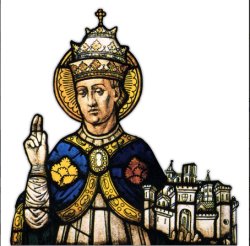
Mr. Berlusconi’s plans to attend the Perdonanza was seen by the Italian public as a gesture in the direction of atonement.
The service was established in the 13th century by Pope Celestine V, who decreed that anyone who entered the basilica on August 28 and 29 could receive a plenary indulgence–if they have already confessed to their sins in private and taken Communion.
In its statement, the Vatican said Mr. Berlusconi’s dinner plans with Cardinal Tarcisio Bertone, who officiated Friday’s service, was called off partly out of concern that the meeting woul be “exploited.” The Vatican official said the Holy See didn’t want to be viewed as giving a “benediction” to Mr. Berlusconi’s political positions and his personal life.
The situation become more complicated and shaded when Gian Maria Vian, editor of the Vatican’s semi-official daily, L’Osservatore Romano, didn’t speak out on behalf of Boffo in an interview with the Italian newspaper Il Courier della Sera. 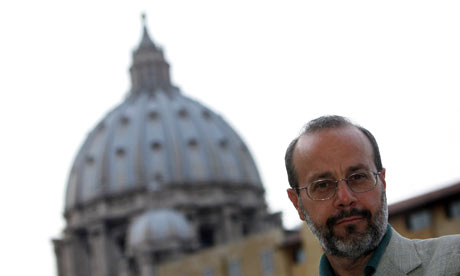
Vian restated the decision of the Holy See’s newspaper not to write about Berlusconi’s private life because the paper is international and is not designed to cover controversies in Italian politics.
Vian further expressed his opinion that some recent editorials in Avenire were exaggerated when, for example, one article compared the government’s position on immigration to that of the Italian administratin prior to the Holocaust.
The comments of Vian were interpreted as constituting a point of contention between the Vatican newspaper and the Italian Bishops’ Conference. Benedict XVI sought to dispel any ideas of a rift by personally calling Cardinal Bagnasco, president of the conference, and affirming his esteem for the episcopal body.
Both in articles published in Avvenire,as well as in the letter to Cardinal Bagnasco tendering his resignation, Boffo, who is married, insists on his innocence and states that Il Giornale‘s accusations are not true.
He thanked the Church for its support, but aded that it “has better things to do than strenuously defend one person, even if unfairly targeted.”
Boffo said he believes the attacks against him are due to the fact that Avvenire is a voice that is independent of “secular power.” He asks, “What future of liberty and responsibility will there be for our information?”
Cardinal Bagnasco expressed in a communique gratitude to Boffo “for the commitment shown over many years with competence, rigor and passion, in fulfilling such a precious assignment for the life of the Church and of Italian society.”
The cardinal also expressed his “closeness and support” to the former director. 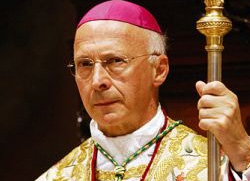
Cardinal Angelo Bagnasco was in the news a few years ago when he claimed that permitting gay marriages was merely the beginning of slippery slope. “Why then say ‘no’ to incest? Why say ‘no’ to the pedophile party in Holland?” he asked.
Draw your own conclusions.























